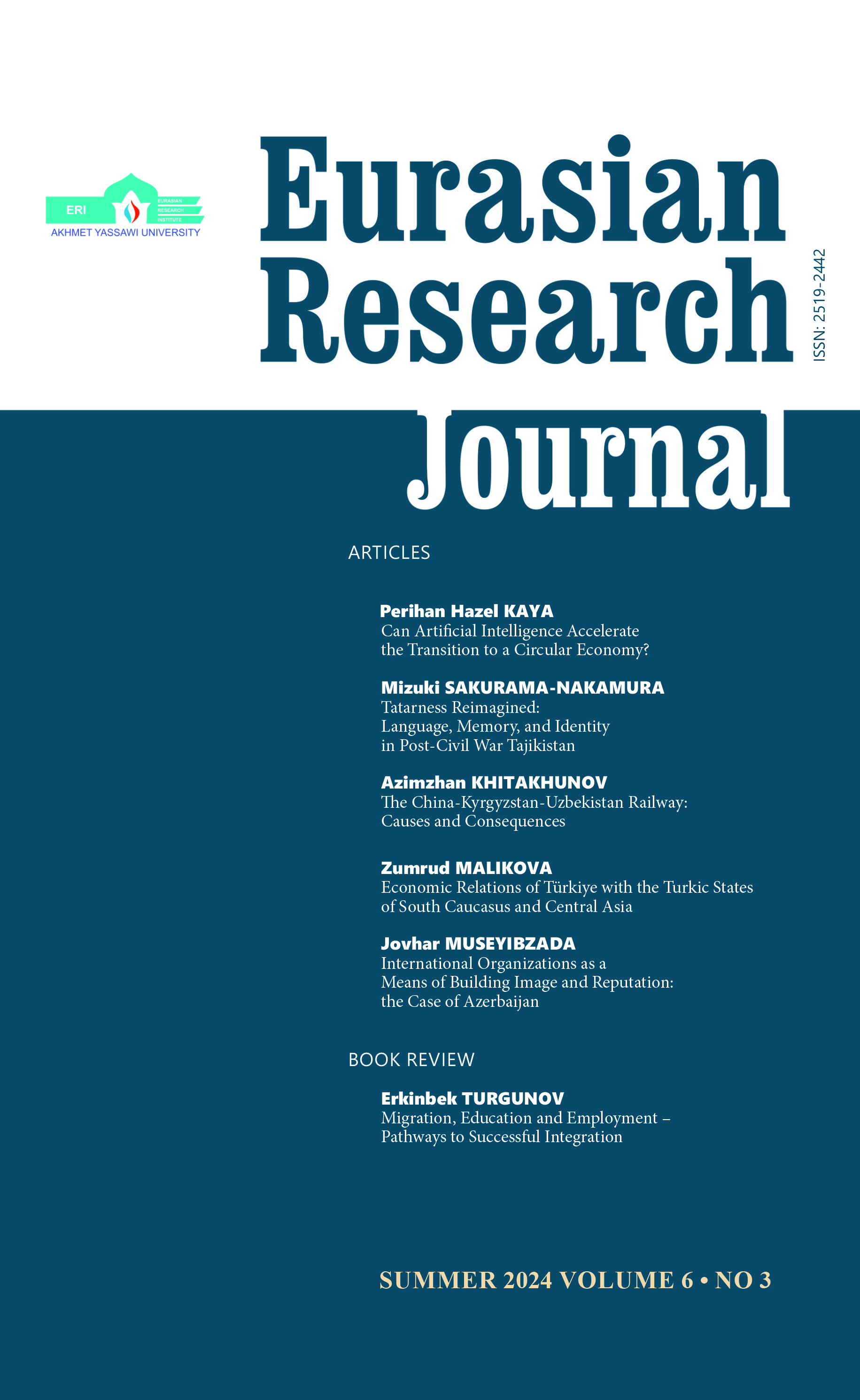6 (3), 2024
 .
.
Editorial Board
Perihan Hazel KAYA
CAN ARTIFICIAL INTELLIGENCE ACCELERATE THE TRANSITION TO A CIRCULAR ECONOMY?The world’s current model of economic development is unsustainable. It promotes the inappropriate use of limited natural resources, encourages consumption and waste, causing serious damage to the environment and generating large amounts of waste. The circular economy, an economic model in which resources are recycled and reused as much as possible by following a circular path rather than a linear path during consumption, has been gaining popularity around the world in recent years. Artificial intelligence (AI), one of the most important developments of our time, can also play an important role in the realisation of the circular economy. AI can complement and extend the skills of humans. It helps people learn faster, deal with complexities more effectively, and better understand the abundance of data. AI can facilitate new circular business models within the circular economy and help design sustainable and robust products. The aim of this study is to seek answers to questions such as how artificial intelligence contributes to the transition to a circular economy and whether artificial intelligence can accelerate the transition to a circular economy. While seeking answers to these questions, we argue that artificial intelligence has significant potential in the transition to a circular economy and will play an important role in this transition.
Keywords: Sustainability, Circular economy, Artificial intelligence
DOI : https://doi.org/10.53277/2519-2442-2024.3-01 [HTML]
TATARNESS REIMAGINED: LANGUAGE, MEMORY, AND IDENTITY IN POST-CIVIL WAR TAJIKISTANThis paper examines the transformation of ethnic identity among the Tatar community in Tajikistan in the wake of the Tajik Civil War. Drawing on in-depth interviews, it analyses how the war and subsequent dispersion and migration have reconfigured Tatar ethnic ties and fostered the emergence of a hybrid identity. The findings reveal a complex process of identity formation, where the loss of homeland and language intertwines with the development of a Tajikistani national identity and the experience of differentiation through labour migration. The paper argues that the Tatar community’s self-definition as ‘Tatar of Tajikistan’ epitomises the resilience of people navigating multiple contexts and transcending conventional categories of ethnicity and migration. It offers insights into the dynamics of identity politics amidst post-socialist transition and war.
Keywords: Ethnic identity, Tajik Civil War, Tatar diaspora, Language shift, Labour migration.
DOI : https://doi.org/10.53277/2519-2442-2024.3-02 [HTML]
THE CHINA-KYRGYZSTAN-UZBEKISTAN RAILWAY: CAUSES AND CONSEQUENCESThis paper aims to analyse the causes and consequences of the China-Kyrgyzstan- Uzbekistan railway. The project is one of the most important and ambitious in the modern history of Central Asia. The construction of the railway will transform trade and transit routes in Eurasia. The paper argues that the start of the project was driven by internal, regional, and global factors. The expected benefits from the railway are significant for each participating country. Kyrgyzstan and Uzbekistan plan to develop their infrastructure, diversify exports, and penetrate new markets, while China diversifies its transit routes and deepens economic integration with Central Asia. However, the paper highlights that there are important risks related to the railway, and addressing these will increase the benefits of the project.
Keywords: The China-Kyrgyzstan-Uzbekistan railway, Central Asia, Transport, Infrastructure, International trade.
DOI : https://doi.org/10.53277/2519-2442-2024.3-03 [HTML]
ECONOMIC RELATIONS OF TÜRKIYE WITH THE TURKIC STATES OF SOUTH CAUCASUS AND CENTRAL ASIAIn the present era, the Turkic states are experiencing an upward trajectory in the expansion of their relationships, particularly in the economic sphere. After the collapse of the USSR, the Turkic states that regained their independence – Azerbaijan, Kazakhstan, Kyrgyzstan, Turkmenistan, and Uzbekistan – followed different dynamics of economic development. These Turkic states are located in regions of significant geopolitical and geostrategic importance, spanning a wide area from the Adriatic to the Great Wall of China. The purpose of the study is to examine the dynamics of the development of economic relations between Türkiye and the Turkic states of South Caucasus and Central Asia in the modern era. The main objectives are to examine the economic potential of the Turkic states and Türkiye’s economic policy towards the Turkic states of the South Caucasus and Central Asia, to analyze the development dynamics and characteristics of the economic relations between Türkiye and the Turkic states of these two regions.
Keywords: Türkiye, Turkic states, Bilateral economic relations, Cooperation in the energy sphere, Economic potential, Economic policy, Turkic integration
DOI : https://doi.org/10.53277/2519-2442-2024.3-04 [HTML]
INTERNATIONAL ORGANIZATIONS AS A MEANS OF BUILDING IMAGE AND REPUTATION: THE CASE OF AZERBAIJANAzerbaijan, a key player in the South Caucasus, has leveraged its participation in international organizations (IOs) to enhance its global image and reputation. Azerbaijan strategically uses international platforms to advance its global standing. This article explores the country’s activities within the Organisation of Islamic Cooperation, the Economic Cooperation Organization, and the Organization of Turkic States by analysing the country’s approach in undertaking initiatives to build its international standing. This research emphasises Azerbaijan’s role in shaping and driving cooperative endeavours on the global stage. The practical significance of the analyses is to offer insights into the dynamics of initiatives undertaken by Azerbaijan within international organizations, taking the perspective of emerging theoretical discussions on ‘small states’ in international relations. The method of the study is based on a systematic analysis of legal documents (i.e. declarations, agreements, and others), speeches, and news from the official websites of Azerbaijan and international organizations
Keywords: Azerbaijan, International organizations, Reputation, Image-building, Rising minor power.
DOI : https://doi.org/10.53277/2519-2442-2024.3-05 [HTML]
Book Review: MIGRATION, EDUCATION AND EMPLOYMENT – PATHWAYS TO SUCCESSFUL INTEGRA
